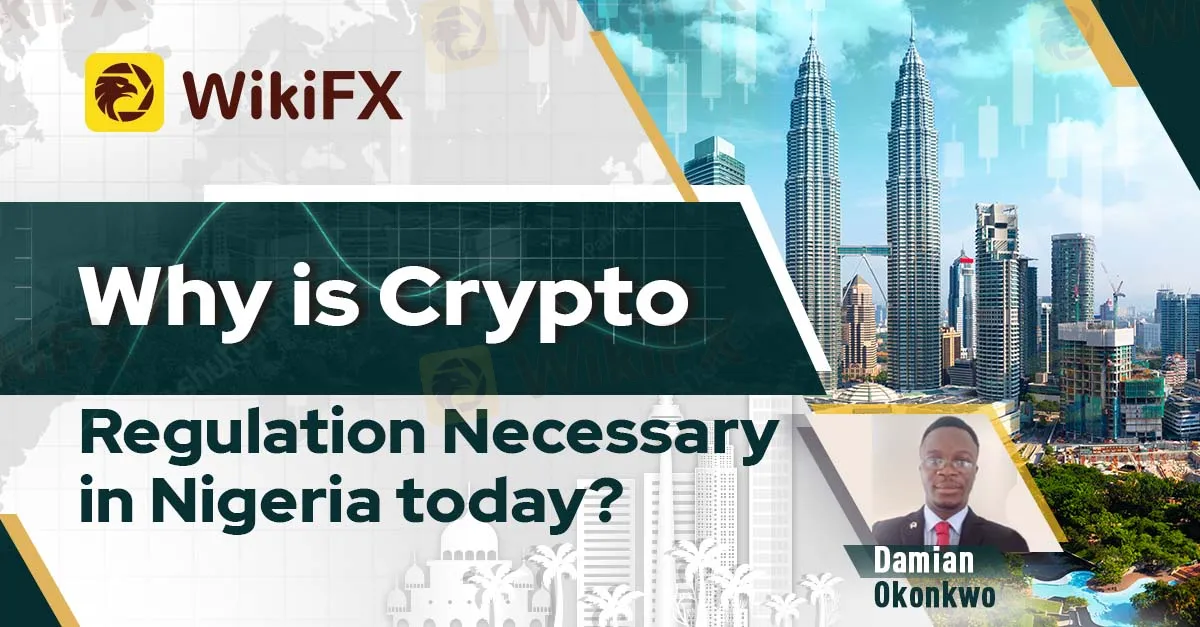简体中文
繁體中文
English
Pусский
日本語
ภาษาไทย
Tiếng Việt
Bahasa Indonesia
Español
हिन्दी
Filippiiniläinen
Français
Deutsch
Português
Türkçe
한국어
العربية
Why is Crypto Regulation Necessary in Nigeria today?
Abstract:Nigeria needs a comprehensive regulatory framework that addresses all aspects of the cryptocurrency market. This framework should be designed to protect investors from fraud and cyber attacks.

By: Damian Okonkwo

Introduction
Nigeria boasts one of the most vibrant and active cryptocurrency ecosystems in the world. Despite the lack of formal recognition by the Central Bank of Nigeria (CBN), Nigerians have embraced cryptocurrencies as a hedge against inflation, a conduit for remittances, and a gateway to global markets. However, this burgeoning sector currently operates in a regulatory grey area. This lack of clarity presents significant risks for investors and hinders the industry's potential to contribute meaningfully to the Nigerian economy.
Why Crypto Regulation is Necessary in Nigeria Today
There are several compelling arguments for why crypto regulation is necessary in Nigeria today:
1. Investor Protection: The volatile nature of cryptocurrencies and the prevalence of scams expose investors to significant financial risks. A regulatory framework would require exchanges to comply with anti-money laundering (AML) and Know Your Customer (KYC) protocols, protecting investors from fraudulent activities and ensuring transparency in the market.
2. Financial Stability: The widespread use of cryptocurrencies could pose risks to the stability of the Nigerian financial system. Cryptocurrencies are not currently subject to any regulatory oversight, which could lead to their use for illicit activities or financial instability. Regulation would enable authorities to monitor the market and mitigate these risks.
3. Fostering Innovation: A clear and well-defined regulatory framework can provide a stable environment for the cryptocurrency industry to thrive. This would attract investment, encourage innovation, and create new jobs in the Nigerian economy.
4. Promoting Tax Compliance: The current lack of regulation makes it difficult for the government to collect taxes on cryptocurrency transactions. A regulatory framework would bring cryptocurrencies within the tax net, generating additional revenue for the government.
5. Combating Financial Crimes: Cryptocurrencies have been associated with various financial crimes, including money laundering, terrorism financing, and tax evasion. Regulation would enable authorities to track and deter such activities, making Nigeria's financial system less susceptible to criminal activity.
The Regulatory Landscape
In May 2022, the Securities and Exchange Commission (SEC) issued a set of regulations for digital assets, including cryptocurrencies. This was a positive step towards creating a regulatory framework for the industry. However, the SEC's regulations only apply to the initial issuance and sale of digital assets, leaving other aspects of the market unregulated.
The Way Forward
Nigeria needs a comprehensive regulatory framework that addresses all aspects of the cryptocurrency market. This framework should be designed to:
● Protect crypto investors from fraud and cyber attacks.
● Maintain the stability of the financial system.
● Foster innovation and growth in the industry.
● Promote tax compliance.
● Combat financial crimes.
Conclusion
Cryptocurrency regulation is not a matter of “if” but “when.” The Nigerian government must act now to implement a well-designed regulatory framework that fosters a vibrant and responsible cryptocurrency ecosystem. This framework will not only protect investors and maintain financial stability but also unlock the full potential of cryptocurrencies to contribute to the Nigerian economy.

Disclaimer:
The views in this article only represent the author's personal views, and do not constitute investment advice on this platform. This platform does not guarantee the accuracy, completeness and timeliness of the information in the article, and will not be liable for any loss caused by the use of or reliance on the information in the article.
Read more

What Are The Top 5 Cryptocurrency Predictions For 2025?
Discover the top 5 cryptocurrency predictions for 2025, including Ethereum's rise, a potential bear market, meme coin struggles, and regulatory shifts.

Stablecoins: The New Frontier in Digital Finance?
In 2024, while Bitcoin’s surge past US$100,000 captured global attention, financial institutions turned their focus to stablecoins. Will stablecoins be the new frontier in digital finance for the year of 2025?

Top 9 Financial Fraud Cases in Recent History
Know the top 9 financial fraud cases in history, from Enron to FTX, uncovering deception and greed. Learn how WikiFX protects investors from scams and fraud.

KuCoin Pay Introduces Easy Crypto Payments for Merchants
How KuCoin Pay, an innovative PoS system enabling merchants to accept 54 cryptocurrencies, including Bitcoin, Ethereum, and USDT, for seamless transactions.
WikiFX Broker
Latest News
Will Gold Break $2,625 Amid Fed Caution and Geopolitical Risks?
ECB Targets 2% Inflation as Medium-Term Goal
New Year, New Surge: Will Oil Prices Keep Rising?
PH SEC Issues Crypto Guidelines for Crypto-Asset Service Providers
FTX Chapter 11 Restructuring Plan Activated: $16 Billion to Be Distributed
Think Before You Click: Malaysian Loses RM240,000 to Investment Scam
Bithumb CEO Jailed and Fined Over Bribery Scheme in Token Listing Process
WikiFX Review: Something You Need to Know About Saxo
Is PGM Broker Reliable? Full Review
Terraform Labs Co-founder Do Kwon Extradited to the U.S. to Face Fraud Charges
Currency Calculator






